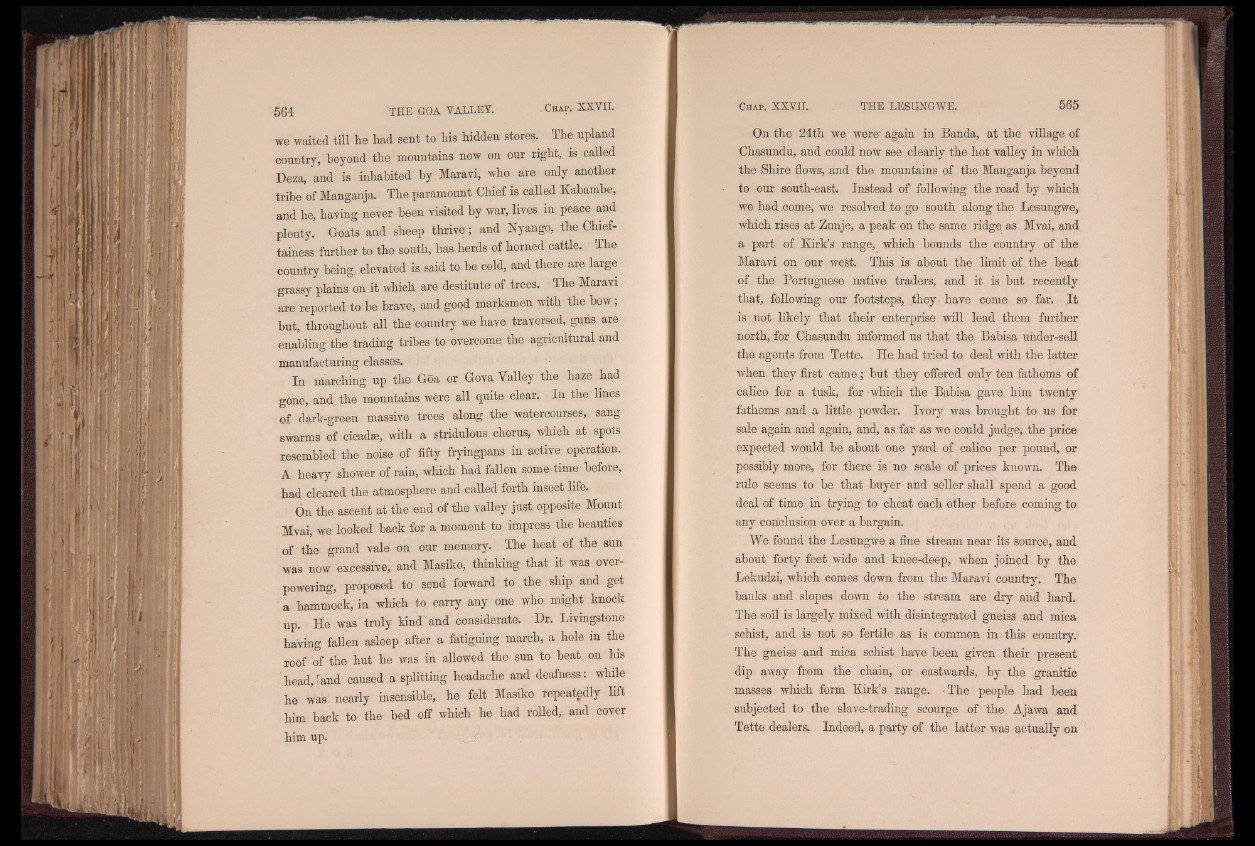
we waited till he had sent to his hidden stores. The upland
country, beyond the mountains now on our right, is called
Deza, and is inhabited by Maravi, who are only another
tribe of Manganja. The paramount Chief is called Kabambe,
and he, having never been visited by war, lives in peace and
plenty. Goats and sheep thrive; and Nyango, the Chief-
tainess further to the south, has herds of horned cattle. The
country being, elevated is said to be cold, and there are large
grassy plains on it which are destitute of trees. The Maravi
are reported to be brave, and good marksmen with the bow;
but, throughout all the country we have traversed, guns are
enabling the trading tribes to overcome the agricultural and
manufacturing classes.
In marching up the Goa or Gova Yalley the haze had
gone, and the mountains were all quite clear. In the lines
of dark-green massive trees along the watercourses, sang
swarms of cicadas, with a stridulous chorus, which at spots
resembled the noise of fifty fryingpans in active operation.
A heavy shower of rain, which had fallen some time before,
had cleared the atmosphere and called forth insect life.
Ón the ascent at the end of the valley just opposite Mount
Mvai, we looked back for a moment to impress the beauties
of the grand vale on our memory. The heat of the sun
was now excessive, and Masiko, thinking that it was overpowering,
proposed to send forward to the ship and get
a hammock, in which to carry any one who might knock
up. He was truly kind and considerate. Dr. Livingstone
having fallen asleep after a fatiguing march, a hole in the
roof of the hut he was in allowed the sun to beat on his
head,- and caused a splitting headache and deafness: while
he was nearly insensible, he felt Masiko repeatedly lift
him back to the bed off which he had rolled,, and cover
him up.
On the 24th we were- again in Banda, at the village of
Chasundu, and could now see clearly the hot valley in which
the Shire flows, and the mountains of the Manganja beyond
to our south-east. Instead of following the road by which
we had come, we resolved to go south along the Lesungwe,
which rises at Zunje, a peak on the same ridge as Mvai, and
a part of Kirk’s range, which bounds the country of the
Maravi on our west. This is about the limit of the beat
of the Portuguese native traders, and it is but recently
that, following our footsteps, they have come so far. I t
is not likely that their enterprise will lead them further
north, for Chasundu informed us that the Babisa under-sell
the agents from Tette. He had tried to deal with the latter
when they first came; but they offered only ten fathoms of
calico for a tusk, for which the Babisa gave him twenty
fathoms and a little powder. Ivory was brought to us for
sale again and again, and, as far as we could judge, the price
expected would be about one yard of calico per pound, or
possibly more, for there is no scale of prices known. The
rule seems to be that buyer and seller shall spend a good
deal of time in trying to cheat each other before coming to
any conclusion over a bargain.
We found the Lesungwe a fine stream near its source, and
about forty feet wide and knee-deep, when joined by the
Lekudzi, which comes down from the Maravi country. The
banks and slopes down to the stream are dry and hard.
The soil is largely mixed with disintegrated gneiss and mica
schist, and is not so fertile as is common in this country.
The gneiss and mica schist have been given their present
dip away from the chain, or eastwards, by the granitic
masses which form Kirk’s range. -The people had been
subjected to the slave-trading scourge of the Ajawa and
Tette dealers. Indeed, a party of the latter was actually on